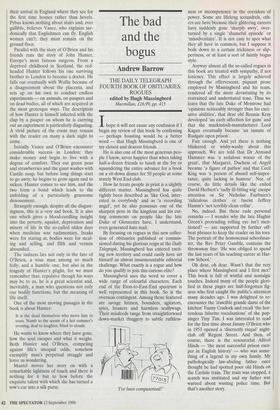The bad and the bogus
Andrew Barrow
THE DAILY TELEGRAPH FOURTH BOOK OF OBITUARIES: ROGUES edited by Hugh Massingberd Macmillan, £16.99, pp. 415 Ihope it will not cause any confusion if I begin my review of this book by confessing — perhaps boasting would be a better word — that Hugh Massingberd is one of my closest and dearest friends.
He is also one of the most generous peo- ple I know, never happier than when taking half-a-dozen friends to lunch at the Ivy or squandering the entire advance for a book on a sit-down dinner for 50 people at some stately West End club.
How he treats people in print is a slightly different matter. Massingberd has quite rightly been described as 'like God, inter- ested in everybody' and as 'a recording angel', yet he also possesses one of the sharpest pens in the kingdom and his cut- ting comments on people like the late Duke of Gloucester have, I understand, even generated hate mail.
By focusing on rogues in this new collec- tion of obituaries published or commis- sioned during his glorious reign at the Daily Telegraph, Massingberd has entered excit- ing new territory and could easily have set himself an almost insurmountable editorial challenge. What exactly is a rogue and how do you qualify to join this curious elite?
Massingberd uses the word to cover a wide range of colourful characters. Each end of the Eton-to-East-End spectrum is well represented in this book. So is the overseas contingent. Among those featured are savage hitmen, bounders, agitators, spies, hoaxers and harmless scallywags. Their misdeeds range from straightforward down-market thuggery to subtle ruthless- 'I've been computerised!' ness or incompetence in the corridors of power. Some are lifelong scoundrels, oth- ers are here because their glittering careers have suddenly gone 'sharply awry', over- turned by a single 'shameful episode' or 'misadventure'. It is not easy to spot what they all have in common, but I suppose it boils down to a certain trickiness or slip- periness, or at least a sort of faintly bogus style.
Anyway almost all the so-called rogues in this book are treated with sympathy, if not leniency. This effect is largely achieved through the effervescent, piquant prose employed by Massingberd and his team, rendered all the more devastating by its restrained and understated tone. Thus we learn that the late Duke of Montrose had 'opinions noticeably stronger than his exec- utive abilities', that dear old Ronnie Kray developed 'an early affection for guns' and that the mackintosh-manufacturer Lord Kagan eventually became 'an inmate of Rudgate open prison'.
Fair enough. And yet there is nothing blinkered or wishy-washy about this approach. We are told that Dr Armand Hammer was 'a sedulous wooer of the great', that Margaret, Duchess of Argyll became 'a figure of pathos' and that Cecil King was 'a person of absurd self-impor- tance, quite lacking in humour'. Nor, of course, do little details like the exiled David Herbert's 'sadly ill-fitting wig' escape attention or Sir Nicholas Fairbairn's 'ridiculous clothes' or fascist Jeffrey Hamm's 'not terribly clean collar'.
No, indeed. But these rude personal remarks — I wonder why the late Hughie Green's protruding rolling eye isn't men- tioned? — are supported by further off- beat phrases to keep the reader on his toes. The portrait of the homosexual schoolmas- ter, the Rev Peter Gamble, contains the throwaway line: 'He was obliged to spend the last years of his teaching career at Har- row School.'
Oh dear, oh dear. Wasn't that the very place where Massingberd and I first met? This book is full of wistful and nostalgic touches. Indeed many of the people glori- fied in these pages are half-forgotten fig- ures who first caught the public's attention many decades ago. I was delighted to re- encounter the 'irascible grande dame of the kitchen' Fanny Cradock and recall 'the hor- rendous falsetto vocalisations' of the pop- singer Tiny Tim. I was interested to read for the first time about Jimmy O'Brien who in 1953 opened a 'discreetly risque' night- club off Regent Street. And then, of course, there is the resourceful Alfred Hinds — 'the most successful prison esca- per in English history' — who was some- thing of a legend in my own family. my pathologically law-abiding father once thought he had spotted poor old Hinds on the Carlisle train. The train was stopped, a search was instituted and my father was warned about wasting police time. But that's another story.


































































 Previous page
Previous page